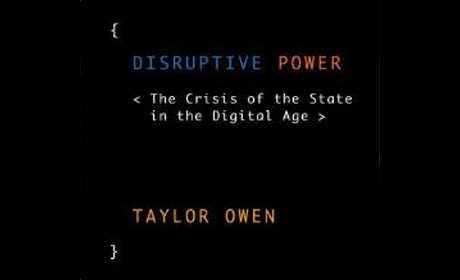
From Edward Snowden to the Arab Spring, digital technology offers non-journalists a means of broadcasting and disseminating information previously strong-armed by the mainstream media.
A new book, launched yesterday at an event hosted by the Tow Center for Digital Journalism, examines how the "disruptive power" of new technology is challenging the traditional role of journalists and newsrooms.
The author of Disruptive Power: The Crisis of the State in the Digital Age is Taylor Owen, professor of digital media and global affairs at the University of British Columbia.
Owen told Journalism.co.uk he was driven to write the book by his academic work into how digital technology such as smartphones and social media were empowering those who felt they were not being protected by governments and other official institutions.
Through his work at the Tow Center, where Owen is research director, he explained he "began to see a lot of parallels between the challenges these traditional 20th century media companies were facing, and the challenges that big states and bureaucracies were facing".
There are many examples of people using technology to empower themselves, said Owen, from citizens broadcasting from war zones, overriding traditional journalism, to "crisis mappers" who produce crowdsourced maps during social or political instability to highlight areas of conflict or those requiring aid.
"The big question is", he asked, "whether these actions are meaningful, are these really challenging institutional powers?"

The cover of Disruptive Power: The Crisis of the State in the Digital Age by Taylor Owen.
At a time when anyone with access to the internet and a smartphone can blog, tweet or livestream from a breaking news event, traditional media no longer has a monopoly over the creation and distribution of information.
The impact of this is perhaps most apparent in foreign reporting, with many outlets shuttering their overseas bureaus and becoming increasingly reliant on local correspondents and eyewitness media.
One example Owen points to in his book is the Siege of Homs, in which Sunday Times correspondent Marie Colvin was killed by bombing in 2012.
According to Owen, this was "the first conflict that was broadcast live from phones", as local people in Homs livestreamed the destruction of their city direct to YouTube and Bambuser.
"I think that really challenges what we think of as a witness and as a foreign correspondent," he said.
"And at the same time it empowered those people [in Homs] to tell their own stories and to document their own events from their perspective and their voice, which is a de-stabilising thing for what was a very curated media system."
Arguably, what traditional media holds over citizen journalists, as Owen refers to them, is a sense of authority – a trusted brand, a reputation – often carved out over many years.
While there is no doubt new technologies have leveled the media playing field in terms of allowing access to remote or volatile parts of the world and inviting new perspectives into the conversation, there are other areas where this "disruption" may be less welcome.
There has been much talk recently of algorithms replacing editors as it becomes the norm for people to access stories through the side-door of social media rather than going direct to an outlet's publication, either in print or online.What skills do you need to hold an algorithm to account?Taylor Owen, author
Indeed, Facebook is discussing partnerships with news organisations in which they publish straight to the social network, rather than post a link, with both parties taking a share of the ad revenue.
Because of the way people now consume news online, Owen noted that a key factor in how visible a story becomes is often "what people think is important and how they share it".
Though he doesn't believe authority exists inside institutions anymore, in the way it did 10 or 20 years ago, he admits he is "not sure we've quite figured out what authority looks like in a de-centralised network".
As such, the role of the journalist is still evolving, introducing skills and areas of expertise unheard of in the pre-internet age.
"What skills do you need to hold an algorithm to account?" asks Owen. "It might not be sufficient just to be able to conduct interviews and ask questions and search documents, you might need to be a computer scientist."
He sees verification as another area where the role of the journalist has risen to match the "disruptive power" of technology.
"Look at what Andy Carvin did during the Arab Spring – developed these new norms of social media verification and filtering of social media content," he said.
"I think that the journalistic role is just as important if not more important in this new, much messier, online ecosystem of information, but what it means to act as a journalist in that world is still quite convoluted."
Free daily newsletter
If you like our news and feature articles, you can sign up to receive our free daily (Mon-Fri) email newsletter (mobile friendly).









